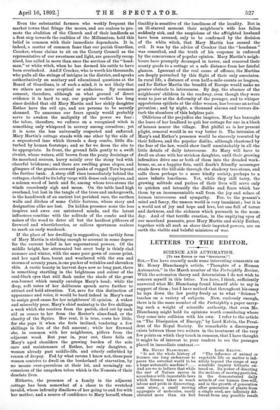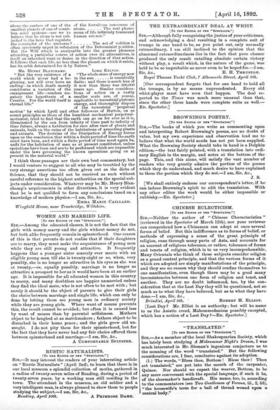LETTERS TO THE EDITOR.
SCIENCE AND AUTOMATISM.
[To TIM EDITOZ OP ms SPEEVATOR:] SIR,—You have recently made some interesting comments on Mr. Henry Blanchamp's article, "Thoughts of a Human Automaton," in the March number of the Fortnightly Review, With the automaton theory and determinism I do not wish to concern myself in this letter. You have, I think, sufficiently answered what Mr. Blanchamp found himself able to say in support of them ; but I have noticed that throughout his essay he lays down the law pretty freely as to what "Science" teaches on a variety of subjects. Now, curiously enough, there is in the same number of the Fortnightly a paper carry- ing such a weight of scientific authority, that even Mr. Blanchamp might hold its opinions worth considering where they come into collision with his own. I refer to the article on "The Dissipation of Energy," by Lord Kelvin, the Presi- dent of the Royal Society. So remarkable a discrepancy exists between these two writers in the treatment of the very few points on which they touch in common, that I have thought it might be of interest to your readers to see the passages placed in immediate contrast :- Ma.
HENRY BLANCHE/EP.
"Is not the whole history of Science one long endeavour to prove the external world to be a huge automatic machine P And are we to believe that while the rest of Nature moves in accordance with immutable laws which Science takes so much labour and pride in discovering, man alone, a small moving aggregate of molecules, rarely elevated more than six feet
LORD KELVIN.
"The influence of animal or vegetable life on matter is infi- nitely beyond the range of any scientific inquiry hitherto en- tered on. Its power of directing the motions of moving particles, in the demonstrated daily miracle of our human free-will, and in the growth of generation after generation of plants from a single seed, are infinitely dif- ferent from any possible result
above the surface of one of the of the fortuitous concourse of smallest planets of one of count- atoms. . . . . . The real pheno- less solar systems—are we to mena of life infinitely transcend believe that he alone is not sub- human science."
jected to the laws that regulate the remainder of the universe The act of volition is often speciously urged in refutation of the Determinist position. But the Will which is analysable into the greater pleasure attending a particular course of action over its alternatives, is itself an inherited want or desire in the direction of that action. It follows that each life, no less than the planet on which it exists, has its orbit determined for it by Nature?'
MR. HENRY BLANCHADIP. LORD KELVIN.
" But the very existence of a "The whole store of energy now world which never had a be- in the sun is essentially ginning, nor will ever have an finite; and there is much less of ending—in which death merely it now than there was 300,000 constitutes a variation of the years ago. Similar considera- omnipresent life—renders nu- tions of action on a vastly gatory the hypothesis of a smaller scale are, of course, Creator. For the world itself is applicable to terrestrial plutonic
eternal life." energy, and thoroughly dispose
of the terrestrial perpetual motion' by which Lyell and other followers of Hutton, on as sound principles as those of the humblest mechanical perpetual- motionist, tried to find that the earth can go on for ever as it is, illuminated by the sun from infinity of time past to infinity of time future, always a habitation for race after race of plants and animals, built on the ruins of the habitations of preceding plants and animals. The doctrine of the Dissipation of Energy forces upon us the conclusion that within a finite period of time the earth must have been, and within a finite period of time must again be, unfit for the habitation of man as at present constituted, unless operations have been and are to be performed which are impossible under the laws governing the known operations going on at present in the material world."
I think these passages are their own best commentary, but I would venture to suggest to all who may be troubled by the very strange assertions too often given out as the dicta of Science, that they should not be received as such without careful reference to the highest authorities on the special sub- jects under consideration. Whatever may be Mr. Henry Blan- champ's acquirements in other directions, it is very evident
that he is not qualified to form any conclusions based on a knowledge of modern physics.—I am, Sir, &c.,
EMMA MARIE CAILLARD.
Wingfield House, near Trowbridge, Wiltshire.

































 Previous page
Previous page